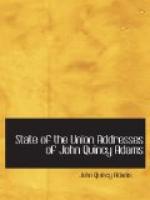The extensive, fertile, and populous dominions of the Sultan belong rather to the Asiatic than the European division of the human family. They enter but partially into the system of Europe, nor have their wars with Russia and Austria, the European States upon which they border, for more than a century past disturbed the pacific relations of those States with the other great powers of Europe. Neither France nor Prussia nor Great Britain has ever taken part in them, nor is it to be expected that they will at this time. The declaration of war by Russia has received the approbation or acquiescence of her allies, and we may indulge the hope that its progress and termination will be signalized by the moderation and forbearance no less than by the energy of the Emperor Nicholas, and that it will afford the opportunity for such collateral agency in behalf of the suffering Greeks as will secure to them ultimately the triumph of humanity and of freedom.
The state of our particular relations with France has scarcely varied in the course of the present year. The commercial intercourse between the two countries has continued to increase for the mutual benefit of both. The claims of indemnity to numbers of our fellow citizens for depredations upon their property, heretofore committed during the revolutionary governments, remain unadjusted, and still form the subject of earnest representation and remonstrance. Recent advices from the minister of the United States at Paris encourage the expectation that the appeal to the justice of the French Government will ere long receive a favorable consideration.
The last friendly expedient has been resorted to for the decision of the controversy with Great Britain relating to the north-eastern boundary of the United States. By an agreement with the British Government, carrying into effect the provisions of the 5th article of the treaty of Ghent, and the convention of September 29th, 1827, His Majesty the King of the Netherlands has by common consent been selected as the umpire between the parties. The proposal to him to accept the designation for the performance of this friendly office will be made at an early day, and the United States, relying upon the justice of their cause, will cheerfully commit the arbitrament of it to a prince equally distinguished for the independence of his spirit, his indefatigable assiduity to the duties of his station, and his inflexible personal probity.
Our commercial relations with Great Britain will deserve the serious consideration of Congress and the exercise of a conciliatory and forbearing spirit in the policy of both Governments. The state of them has been materially changed by the act of Congress, passed at their last session, in alteration of several acts imposing duties on imports, and by acts of more recent date of the British Parliament. The effect of the interdiction of direct trade, commenced by Great Britain and reciprocated by the United States, has




